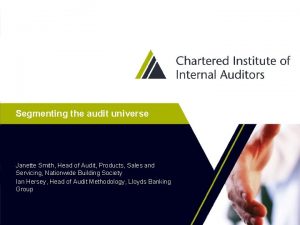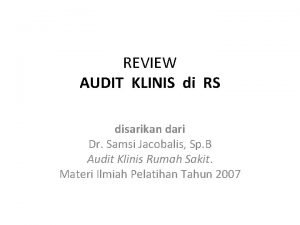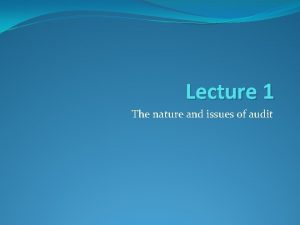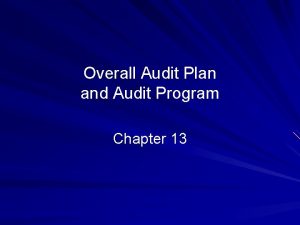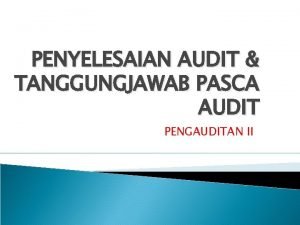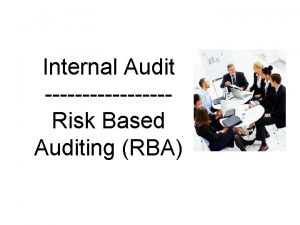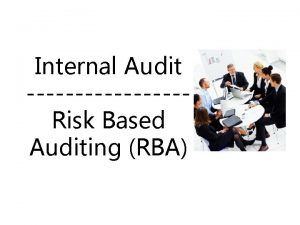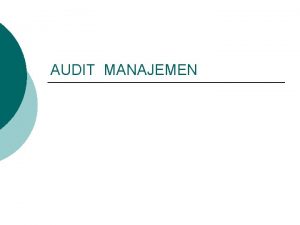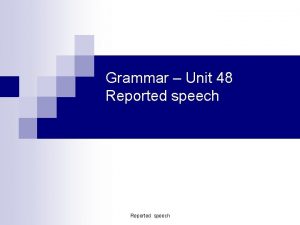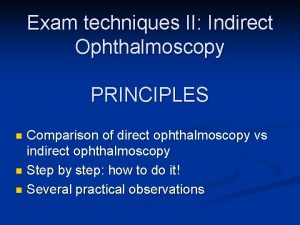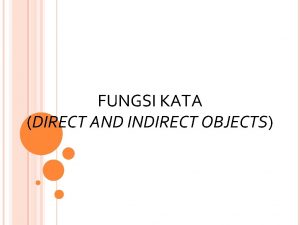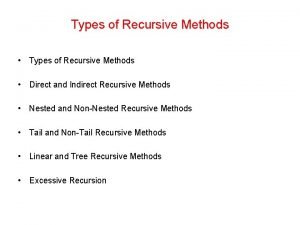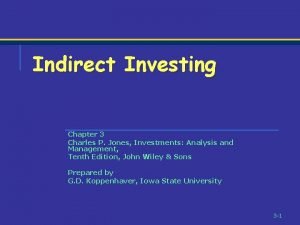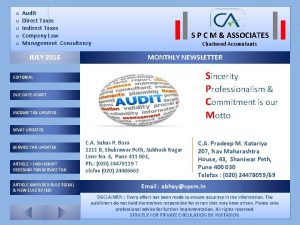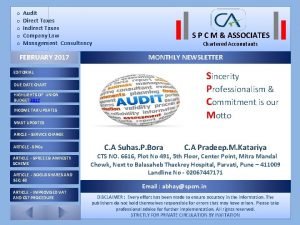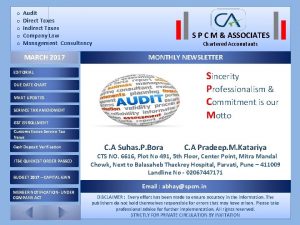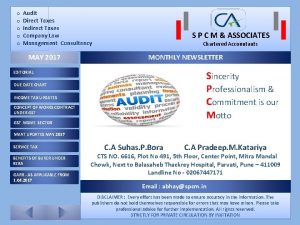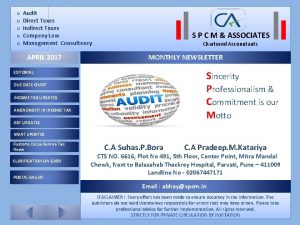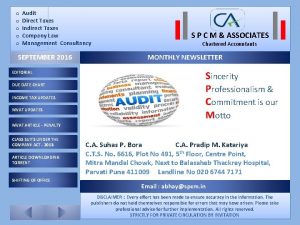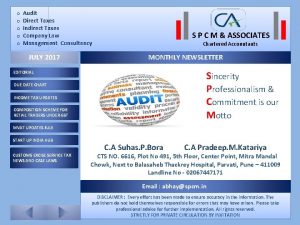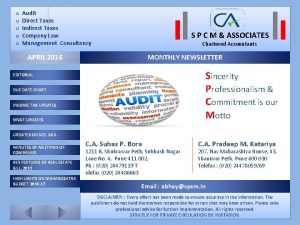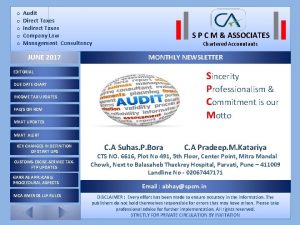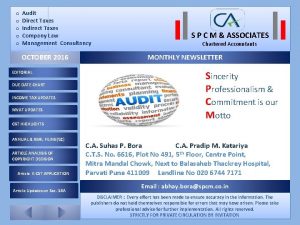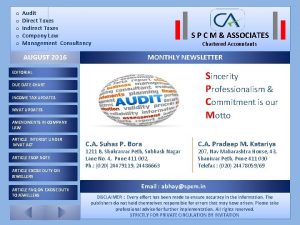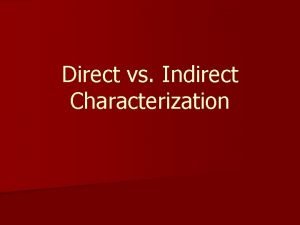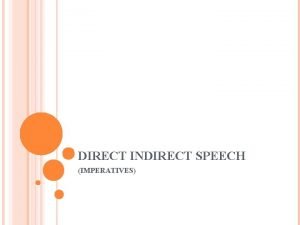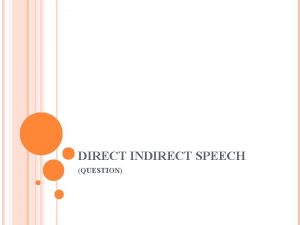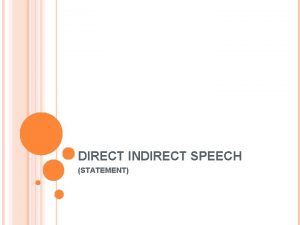o o o Audit Direct Taxes Indirect Taxes

























- Slides: 25

o o o Audit Direct Taxes Indirect Taxes Company Law Management Consultancy DECEMBER 2016 S P C M & ASSOCIATES Chartered Accountants MONTHLY NEWSLETTER Sincerity Professionalism & Commitment is our Motto EDITORIAL DUE DATE CHART MVAT UPDATES NEW BENAMI LAW – AT A GLANCE DEMONETISATION COMPLETES A MONTH: SALIENT FEATURES OF PMGKY 2016 DEMONETIZATION: MYTH OR REALITY SERVICE TAX AMENDMENTS C. A Suhas. P. Bora C. A Pradeep. M. Katariya CTS NO. 6616, Plot No 491, 5 th Floor, Center Point, Mitra Mandal Chowk, Next to Balasaheb Thackrey Hospital, Parvati, Pune – 411009 Landline No - 02067447171 Email : abhay@spcm. in DISCLAIMER : Every effort has been made to ensure accuracy in the information. The publishers do not hold themselves responsible for errors that may have arisen. Please take professional advice for further implementation. All rights reserved. STRICTLY FOR PRIVATE CIRCULATION BY INVITATION

DECEMBER 2016 SPCM & ASSOCIATES MONTHLY NEWSLETTER Editorial - CA. Suhas P. Bora Dear All When we say good bye to 2016 , there are lot may happenings which matter to every citizen of our country : November 8, 2016 at 8 PM: Prime Minister Shri Narendra Modi – Addressed the nation, not to inform about any launch of an assault on warring neighbour or any terrorist group, but it’s an assault on the twin evils plaguing and decaying the Indian economy for seven decades viz. unaccounted (‘Black”) money and counterfeit money. The deadly weapon for the attack being“DEMONETISATION. ”He thundered “The 500 and 1, 000 rupee notes hoarded by antinational and anti-social elements will become just worthless pieces of paper. ” However, he reassured honest people of the country, “the rights and interests of honest, hard-working people will be fully protected. ”Suddenly, the word ‘Demonetisation’ had become both a buzzword as well as a dreaded word amongst Indian citizens from all walks of life. I was deluged with calls seeking clarifications on the effects and impact of such a monumental step taken by the Government. Whats App messages have just not stopped since then. The most surprising moment for me was when one of my client's son a student of 10 th grade also inquired as to what is Demonetisation? Why should hard-earned money in the form of 500 and 1, 000 rupee notes suddenly become invalid? How and when will Government replace my 500 and 1, 000 rupee notes? Yes, Demonetisation is a big word, and on the 8 th November, the full weight of this word was felt across the length and breadth of India. This move has come on the heels of a much publicized and successful Income Declaration Scheme. Mr. Modi had been cautioning citizens to fall in line and declare unaccounted money under IDS- 2016 and not to blame him if later stringent steps were taken. However, his warnings were considered as rhetoric and ignored. The effects of demonetisation are still hotly debated not just in India but across the world. The entire world has taken notice of such a move where the final impact is still awaited. Its effects on the Indian economy will be felt and analyzed in due course. Though there may be positives and negatives of the move, we as citizens of India should ensure to be part of this initiative of weeding out corruption and terrorism from our country. We all must act as responsible citizens and avoid getting carried away by the naive analysis and prognosis of vested interests. Many a discussion are going on whether the Demonitisation is curse or a boon? ? ! Time will only tell us the answer to this question. We of course support any move that will combat black money and its weeding out of the system. EDITORIAL DUE DATE CHART MVAT UPDATES NEW BENAMI LAW – AT A GLANCE DEMONETISATION COMPLETES A MONTH: - SALIENT FEATURES OF PMGKY-2016 DEMONETIZATION: MYTH OR REALITY SERVICE TAX AMENDMENTS

DECEMBER 2016 SPCM & ASSOCIATES MONTHLY NEWSLETTER Editorial - CA. Suhas P. Bora On the front of GST the proposed GST Bills, expected to be passed by Parliament for the roll-out of the Goods and Services Tax will now be tabled in the Winter Session, as the sixth GST Council meeting held on 11, December, 2016 failed to reach a consensus. Let us hope that things sort themselves out. Merry Chrismas to all. Let us bid good bye to 2016 and welcome the new year 2017. CA. Suhas P. Bora EDITORIAL DUE DATE CHART MVAT UPDATES NEW BENAMI LAW – AT A GLANCE DEMONETISATION COMPLETES A MONTH: - SALIENT FEATURES OF PMGKY-2016 DEMONETIZATION: MYTH OR REALITY SERVICE TAX AMENDMENTS

SPCM & ASSOCIATES MONTHLY NEWSLETTER DECEMBER 2016 Due Dates MONTHLY DUE DATES REGISTER FOR DECEMBER 2016 ACT Particulars Due dates SERVICE TAX E- Payment of Service tax by Companies for November 2016 06 th December 2016 INCOME TAX TDS/TCS Payment for the month of November 2016 07 th December 2016 INCOME TAX Payment of 3 rd Installment for Advance Tax For A. Y. 201718 15 th December 2016 PROVIDENT FUND Provident Fund Payment for the month of November 2016 15 th December 2016 EMPLOYEE STATE INSURANCE CORPORATION Employee State Insurance Corporation Payment for the month of November 2016 21 st December 2016 MVAT/CST E-Payment of Monthly VAT and WCTTDS for November 2016 21 st December 2016 MVAT/CST Extended due date for filing of Quarter 1 Returns i. e April 16 to June 16 10 th December 2016 PROFESSION TAX E-Payment of Monthly Tax for November 2016 31 st December 2016 LUXURY TAX E-Payment of Monthly Tax for November 2016 31 st December 2016 NOTE: - If Due date is on Sunday or Public Holidays, the next working day is to be considered as due date. EDITORIAL DUE DATE CHART MVAT UPDATES NEW BENAMI LAW – AT A GLANCE DEMONETISATION COMPLETES A MONTH: - SALIENT FEATURES OF PMGKY-2016 DEMONETIZATION: MYTH OR REALITY SERVICE TAX AMENDMENTS

SPCM & ASSOCIATES MONTHLY NEWSLETTER DECEMBER 2016 MVAT Updates - CA GOURAV OSWAL, CA NIKITA BAJAJ MVAT UPDATES CA GOURAV OSWAL, CA NIKITA BAJAJ RECENT AMENDMENTS 1. Trade Circular No 35 T of 2016 Dt. 12. 11. 2016 The Commissioner of Sales Tax, Maharashtra State, Mumbaihas issued Trade Circular No 35 T of 2016 Dt. 12. 11. 2016 for GST enrolment for dealers registered under MVAT Act, CST Act, Entry Tax Act or Luxury Tax Act. It provides a step-wise procedure for obtaining provisional Login ID and Password for the existing dealers during the period 15/11/2016 to 30/11/2016 which has been further extended till 07/12/2016. GST Enrolment is on the basis of PAN. Hence, only one provisional Login ID & Password will be provided for every PAN. After obtaining provisional login ID and password from the Maharashtra Sales Tax Department, the dealer needs to enroll themselves on the GST Common Portal on www. gst. gov. in. 2. Trade Circular No 36 T of 2016 Dt. 21. 11. 2016 The Commissioner of Sales Tax, Maharashtra State, Mumbai has issued Trade Circular No 36 T of 2016 Dt. 21. 11. 2016 for extending the dates forexemption of late feepayment for filing of VAT returns. As per the circular, dealers who file monthly returns for any period between April 2016 and October 2016 shall be exempted from late fee if the returns are filed by 30 th November 2016, the dealers who filequarterly returns for the period 01 st April to 30 th June 2016 shall be exempted from late fee if the returns are filed by 10 th December 2016 and dealers who file quarterly returns for the period 01 st July 2016 to 30 th September 2016 shall be exempted from late fee if the returns are filed by 21 st January 2016. 3. Trade Circular No 37 T of 2016 Dt. 25. 11. 2016 The Commissioner of Sales Tax, Maharashtra State, Mumbai has issued Trade Circular No 37 T of 2016 Dt. 25. 11. 2016 regarding Computerized Desk Audit (CDA) for the year 2013 -14. The CDA reports and compliance system is available online from where the dealer can access the CDA findings in Form 604 A, accept or reject parameter-wise any tax liability, calculate interest payable and submit the compliance form online. The detailed procedure has been explained in the circular. The CDA compliance has to be done on or before 20/12/2016. Furthermore, certain cases have been selected for comprehensive assessment for the year 2013 -14 and the CDA facility shall not be available for such dealers and they will be required to attend before the assessing authority for verification of books of accounts. EDITORIAL DUE DATE CHART MVAT UPDATES NEW BENAMI LAW – AT A GLANCE DEMONETISATION COMPLETES A MONTH: - SALIENT FEATURES OF PMGKY-2016 DEMONETIZATION: MYTH OR REALITY SERVICE TAX AMENDMENTS

DECEMBER 2016 SPCM & ASSOCIATES MONTHLY NEWSLETTER MVAT Updates - CA GOURAV OSWAL, CA NIKITA BAJAJ B. RECENT NOTIFICATIONS 1. Notification No. VAT 1516/CR 153/Taxation-1 Dt. 12 th November, 2016 The Government of Maharashtra has issued Notification No. VAT 1516/CR-153/Taxation-I Dt 12. 11. 2016 for amending Rule 45 A of the MVAT Rules 2005. A new proviso has been inserted after clause (b) clarifying that the dealers can use the five hundred and thousand rupee notes for payment in cash towards taxes, interest and penalty during the period that the notes are permissible to be legal tender by the Central Government. 2. Maharashtra Ordinance No XXVII of 2016, Dt 17 th November, 2016 Since the Governor of Maharashtra is satisfied that circumstances exist which render it necessary for him to take immediate action to amend the Maharashtra Settlement of Arrears in Disputes Act, the Governor of Maharashtra has moved this ordinance. The said Act provides that, the applicant who desires to settle the arrears in dispute to submit an application to the designated authority upto 15 th November 2016(amended date). Now, with a view to give more time to dealers to settle the disputes relating to payment of tax and to facilitate compliance under the said Act, it is proposed to extend the date upto 30 th November 2016. The Government therefore considers it expedient to amend sections 2, 4 and 5 of the said Act, suitably. 3. Notification No SAD 1516/CR 155/ Taxation-I Dt. 19 th November, 2016 The Government of Maharashtra has issued Notification No SAD 1516/CR 155/ Taxation-I dt. 19. 11. 2016 providing schedule for deferred payment under the Maharashtra Settlement of Arrears in Dispute Act. As per the Notification, the dealer has to pay 50% of the requisite amount payable under the Act by 30. 11. 2016 and the remaining 50% by 31. 12. 2016. Where the payment has been made within the above specified dates, proof of payment will be deemed to have been submitted on date of payment. However the benefits accorded under this rule shall not be available, if applicant has failed to submit application in Form-1 for Settlement of Arrears in Disputes and withdraw the appeal pending before the appellate authority or Tribunal or, as the case may be, before the Court on or before the 30 th November 2016. EDITORIAL DUE DATE CHART MVAT UPDATES NEW BENAMI LAW – AT A GLANCE DEMONETISATION COMPLETES A MONTH: - SALIENT FEATURES OF PMGKY-2016 DEMONETIZATION: MYTH OR REALITY SERVICE TAX AMENDMENTS

DECEMBER 2016 SPCM & ASSOCIATES MONTHLY NEWSLETTER New Benami Law – Adv Abhay H. Bora New Benami Law - At a Glance In the current scenario of demonetization and various search operations by the Enforcement Directorate coupled with series of surgical strikes by the H’ble Prime Minister, the Benami Transactions have come into lime light. Let us understand what these Benami Transactions actually mean. WHAT IS 'BENAMI TRANSACTION'? Benami transaction is a transaction or arrangement whereby the identity of real owner (beneficial owner) of property is concealed by showing someone else (benamidar) as owner on record. The beneficial owner provides or pays consideration for purchase of property. Benami transactions can be entered into by 'any person' (viz. , individual, HUF, firm, company, trust, etc. ). The benamidar can be any person. So also, the beneficial owner can be any person. There are 4 categories of Benami Transactions CATEGORY I: TRANSACTION OR ARRANGEMENT WHERE CONSIDERATION PROVIDED BY PERSON OTHER THAN THE TRANSFEREE OR THE PERSON IN WHOSE NAME PROPERTY IS HELD Under category I, all the following conditions must be satisfied for a transaction to be called a benami transaction: ♦ The transaction or arrangement actually takes place; ♦ Transaction or arrangement results in property being transferred to, or property being held, by a person (benamidar); ♦ Consideration is paid or provided by person other than the benamidar. Such person is called 'beneficial owner'; ♦ Neither the benamidar nor the beneficial owner is fictitious or untraceable; ♦ Benamidar is aware of and does not deny the transaction or arrangement; ♦ The possession of property is with benamidar; and EDITORIAL DUE DATE CHART MVAT UPDATES NEW BENAMI LAW – AT A GLANCE DEMONETISATION COMPLETES A MONTH: - SALIENT FEATURES OF PMGKY-2016 DEMONETIZATION: MYTH OR REALITY SERVICE TAX AMENDMENTS

DECEMBER 2016 SPCM & ASSOCIATES MONTHLY NEWSLETTER New Benami Law – Adv Abhay H. Bora ♦ The property is held by the benamidar for the immediate or future benefit, direct or indirect, of the person providing the consideration (beneficial owner). EXCEPTIONS TO CATEGORY I BENAMI TRANSACTIONS In following circumstances transactions shall not be regarded as 'Benami Transactions', even though consideration is paid by someone other than the benamidar (person in whose name property is held) and the property is held in benamidar's name. 1. HUF PROPERTY HELD IN THE NAME OF KARTA/MEMBERS OF HUF - To avail the exception, following conditions need be satisfied : ♦ Property is held by karta or member of HUF; ♦ Property is held for benefit of karta or other members of HUF; and ♦ Consideration is paid out of known sources of HUF. 2. PROPERTY HELD IN FIDUCIARY CAPACITY - To avail the exception following conditions need be satisfied : ♦ Property is held by a person standing in fiduciary capacity (viz. , as trustee, executor, partner, agent, director of a company, etc. ). ♦ Property is held for the benefit of another person towards whom he stands in fiduciary capacity (viz. , trust/beneciary of trust, firm, principal, company, etc. ) 3. PROPERTY HELD IN THE NAME OF SPOUSE OR CHILD - To avail the exception following conditions need to be satisfied : ♦ Property is held by individual in name of spouse or child. ♦ Consideration is paid out of known sources of individual. 4. Property held by individual in joint names of self and brother/sister/Lineal ascendent (grandson or granddaughter/great grandson or daughter)/Lineal descendent (Parents/grand parents/great grand parents): To avail the exception following conditions need be satisfied: ♦ Property is held by individual in joint names of himself or his brother/sister/lineal ascendent or lineal descendent. ♦ Consideration is paid out of known sources of individual. EDITORIAL DUE DATE CHART MVAT UPDATES NEW BENAMI LAW – AT A GLANCE DEMONETISATION COMPLETES A MONTH: - SALIENT FEATURES OF PMGKY-2016 DEMONETIZATION: MYTH OR REALITY SERVICE TAX AMENDMENTS

DECEMBER 2016 SPCM & ASSOCIATES MONTHLY NEWSLETTER New Benami Law – Adv Abhay H. Bora CATEGORY II: WHERE TRANSACTION IS CARRIED OR MADE IN A FICTITIOUS NAME ♦ Transaction or arrangement in respect of property is benami transaction if transaction is carried out or made in a fictitious name ♦ In other words, the benamidar is fictitious person or entity or non-existent person or entity. ♦ For example, entry in books show money payable to 'Mirchi Seth'. However creditor 'Mirchi Seth' is not traceable and is a fictitious person. CATEGORY III: BENAMIDAR NOT AWARE OF OR DENIES KNOWLEDGE OF TRANSACTION ♦ Transaction or arrangement in respect of property is benami transaction if owner is not aware of, or denies knowledge of, such ownership. ♦ For example, a black money hoarder B deposits Rs. 30 lakhs in Jan Dhan bank account of X a labourer. X has no clue how that money landed in his account and expresses shock when told of it. He denies knowing B or ever having met B or ever talking to him personally or over phone. Bank balance of X, to the extent of Rs. 30 lakhs, is benami property. ♦ For example, jewellery seized from the lockers of a corrupt bureaucrat/politician raided by CBI is explained by him as streedhan of wife. Wife denies any knowledge of these jewellery. These jewellery are benami property. CATEGORY IV : BENEFICIAL OWNER WHO PAID CONSIDERATION IS FICTITIOUS OR IS UNTRACEABLE ♦ Transaction or arrangement in respect of property is benami transaction if beneficial owner is fictitious or is untraceable. 2. WHAT IS BENAMI PROPERTY/BENAMIDAR/BENEFICIAL OWNER ➢ WHAT IS BENAMI PROPERTY? Benami property is any property which is subject matter of benami transaction. It can be in any form viz. , ♦ Immovable property ♦ Movable property e. g. - cash, jewellery, bank deposits ♦ Intangible property ♦ Tangible property ♦ Corporeal or incorporeal property Foreign properties can also be benami properties, provided they are not covered by Black Money Act. EDITORIAL DUE DATE CHART MVAT UPDATES NEW BENAMI LAW – AT A GLANCE DEMONETISATION COMPLETES A MONTH: - SALIENT FEATURES OF PMGKY-2016 DEMONETIZATION: MYTH OR REALITY SERVICE TAX AMENDMENTS

SPCM & ASSOCIATES MONTHLY NEWSLETTER DECEMBER 2016 New Benami Law – Adv Abhay H. Bora ➢ BENAMIDAR ♦ It means a person (individual/HUF/firm/company/AOP/BOI/AJP) in whose name benami property is transferred to or held. ♦ Benamidar may be actual person or fictitious/non-existent person or entity. ♦ Benamidar can be even a mere name-lender, i. e. , where possession of property is with beneficial owner and not with benamidar and only his name is used. ➢ BENEFICIAL OWNER ♦ Beneficial owner is the person for whose benefit property is held by Benamidar. ♦ It is immaterial that identity of beneficial owner is known or not known. 3. CONSEQUENCES OF BENAMI TRANSACTION ➢ BENAMI TRANSACTIONS ENTERED INTO PRIOR 1 -11 -2016 The following are the legal consequences of benami transactions entered into prior to 1 -11 -2016: 1. Benami transaction is a punishable offence Whoever enters into any benami transaction shall be punishable with imprisonment for a term which may extend to three years or with fine or with both. 2. Prohibition of the right to recover property held as benami No suit, claim or action to enforce any right in respect of any property held benami against the person in whose name the property is held or against any other person shall lie by or on behalf of a person claiming to be the real owner of such property. 3. No defence based on any right in respect of any property held benami, whether against the person in whose name the property is held or against any other person, shall be allowed in any suit, claim or action by or on behalf of a person claiming to be the real owner of such property. EDITORIAL DUE DATE CHART MVAT UPDATES NEW BENAMI LAW – AT A GLANCE DEMONETISATION COMPLETES A MONTH: - SALIENT FEATURES OF PMGKY-2016 DEMONETIZATION: MYTH OR REALITY SERVICE TAX AMENDMENTS

DECEMBER 2016 SPCM & ASSOCIATES MONTHLY NEWSLETTER New Benami Law – Adv Abhay H. Bora 4. Property held benami liable to confiscation Any property, which is the subject matter of benami transaction, shall be liable to be confiscated by the Central Government. 5. Prohibition on re-transfer of property by benamidar No person, being a benamidar shall re-transfer the benami property held by him to the beneficial owner or any other person acting on his behalf. Any such re-transfer shall be null and void. However, this prohibition shall not apply where re -transfer is made in accordance with Income Declaration Scheme, 2016 i. e. in accordance with section 190 of the Finance Act, 2016. ➢ BENAMI TRANSACTIONS ENTERED INTO ON OR AFTER 1 -11 -2016 The following are the legal consequences of benami transactions : 1. Benami transaction is a punishable offence Whosoever enters into any benami transaction on or after the 1 -11 -2016 shall be punishable in accordance with section 53 of the Act. Section 53(1) provides that where any person enters into a benami transaction in order to defeat the provisions of any law or to avoid payment of statutory dues or to avoid payment to creditors, the following shall be guilty of the offence of benami transaction: ♦ beneficial owner, ♦ benamidar and ♦ any other person who abets or induces any person to enter into benami transaction Where any person is found guilty of the offence of benami transaction as above, he shall be punishable with rigorous imprisonment for a term not less than one year but which may extend to 7 years and shall also be liable to fine which may extend to 25% of the fair market value of the property. EDITORIAL DUE DATE CHART MVAT UPDATES NEW BENAMI LAW – AT A GLANCE DEMONETISATION COMPLETES A MONTH: - SALIENT FEATURES OF PMGKY-2016 DEMONETIZATION: MYTH OR REALITY SERVICE TAX AMENDMENTS

DECEMBER 2016 SPCM & ASSOCIATES MONTHLY NEWSLETTER New Benami Law – Adv Abhay H. Bora 2. Prohibition of the right to recover property held benami No suit, claim or action to enforce any right in respect of any property held benami against the person in whose name the property is held or against any other person shall lie by or on behalf of a person claiming to be the real owner of such property. 3. No defence based on any right in respect of any property held benami, whether against the person in whose name the property is held or against any other person, shall be allowed in any suit, claim or action by or on behalf of a person claiming to be the real owner of such property. 4. Property held benami liable to confiscation Any property, which is the subject matter of benami transaction, shall be liable to be confiscation by the Central Government. 5. Prohibition on re-transfer of property by benamidar No person, being a benamidar shall re-transfer the benami property held by him to the beneficial owner or any other person acting on his behalf. Any such re-transfer shall be null and void. However, this prohibition shall not apply where re -transfer is made in accordance with Income Declaration Scheme, 2016, i. e. in accordance with section 190 of the Finance Act, 2016. (Please read Part – 2 of the article in next Newsletter) EDITORIAL DUE DATE CHART MVAT UPDATES NEW BENAMI LAW – AT A GLANCE DEMONETISATION COMPLETES A MONTH: - (Cont …) SALIENT FEATURES OF PMGKY-2016 DEMONETIZATION: MYTH OR REALITY SERVICE TAX AMENDMENTS

SPCM & ASSOCIATES MONTHLY NEWSLETTER DECEMBER 2016 DEMONETISATION COMPLETES A MONTH CA ROHAN NAHAR DEMONETISATION COMPLETES A MONTH: INTRODUCTION : At the stroke of the hour on midnight of 9 th November 2016, India lost 86% of its monetary base. The print, electronic and social media has been praising Prime Minister’s masterstroke by which he has reportedly destroyed the base of corruption in India. In this single move, the Government has attempted to tackle all the three issues affecting the economy i. e. a parallel economy, counterfeit currency in circulation and terror financing. There is no doubt that Prime Minister has pulled out a major coop and substantially enhanced his reputation as a strong leader. A month into India’s demonetization initiative, long lines of people looking to exchange notes still spew out of banks, some sectors of the economy continue struggling with the lack of readily available cash, grassroots businesses are still being revolutionized with electronic payment capabilities, and masses of people continue transitioning towards new ways of paying for basic goods and services. On Nov. 8, 86% of India’s currency was nullified in a great demonetization effort that aimed to clean out the black market's cash supply and counterfeit notes which completely disrupted the social, political, and economic spheres of the world’s second largest emerging market. All 500 and 1, 000 rupee notes were instantaneously voided, and a 50 day period ensued where the population could (ideally) redeem their canceled cash for newly designed 500 and 2, 000 rupee notes or deposit them into bank accounts. India has done this before. In 1946, all 1, 000 and 10, 000 rupee notes were recalled. In 1978, 1, 000, 5, 000, and 10, 000 rupee notes were demonetized. This recent activity of demonetization was planned in secret by a small, tight-knit group led by Prime Minister Modi, and it overtook the country like a flash flood. This surprise was by design, as it was feared that if the black market caught wind of what the government was planning they would find ways to rapidly unload their illicit cash, and the initiative would flop on one of its initially-stated goals. EDITORIAL DUE DATE CHART MVAT UPDATES NEW BENAMI LAW – AT A GLANCE DEMONETISATION COMPLETES A MONTH: - SALIENT FEATURES OF PMGKY-2016 DEMONETIZATION: MYTH OR REALITY SERVICE TAX AMENDMENTS

DECEMBER 2016 SPCM & ASSOCIATES MONTHLY NEWSLETTER DEMONETISATION COMPLETES A MONTH CA ROHAN NAHAR Of course, this meant that the rest of Indian society was also caught in the demonetization crossfire. Not even the banks — who would be required to do the heavy lifting on the ground — were in the loop the main for the same was that more prepared you are, the more will be the people who are aware, the more opportunity you're giving to people to find loopholes in the system. Whereas the downside of making it a surprise was that the government and the central bank were severely unprepared to manage the whole situation. In the days following Prime Minister’s announcement, the banks didn’t have enough of the newly designed banknotes on-hand to distribute in exchange for the canceled notes, and there simply wasn’t an adequate supply of smaller denominations in circulation to run the cash economy. Far from being a 50 day transition, it is estimated that even if India’s printing presses were to run 24/7 it would take upwards of four months to a year before the currency supply was adequately restored. Prime Minister’s demonetization initiative caused a sudden breakdown in India’s commercial ecosystem. Trade across all facets of the economy was disrupted, and cash-centric sectors like agriculture, fishing, and the voluminous informal market were virtually shut-down, with many businesses and livelihoods going under completely -- not to mention the economic impact of millions of people standing in line for hours to exchange or deposit canceled banknotes rather than working or doing business. Union Finance Minister Arun. Jaitley said in HT Leadership Summit while justifying the government’s move of demonetization said “When you switch over, it creates disruption. I don’t see disruption lasting too long. You may see the impact for a quarter or so. Then when you look at next 12 -15 quarters, it’s certainly going to benefit, ” Jaitley said. “Of course, you will have some disruption created because of the switchover, in the long run, advantages are going to be huge as far as the relative cost of disruption is concerned. ” However, although India’s demonetization initiative was seemingly severely mismanaged, this doesn’t mean that the entire endeavor was a complete failure. 41 days in, there are some positive indicators. 1. The biggest advantage of demonetization is that it helps the government to track people who are having large sums of unaccounted cash or cash on which no income tax has been paid because many people who earn black money keep that money as cash in their houses or in some secret place which is very difficult to find and when demonetization happens all that cash is of no value and such people have two options one is to deposit the money in bank accounts and pay taxes on such amount and second option is to let the value of that cash reduced to zero. EDITORIAL DUE DATE CHART MVAT UPDATES NEW BENAMI LAW – AT A GLANCE DEMONETISATION COMPLETES A MONTH: - SALIENT FEATURES OF PMGKY-2016 DEMONETIZATION: MYTH OR REALITY SERVICE TAX AMENDMENTS

DECEMBER 2016 SPCM & ASSOCIATES MONTHLY NEWSLETTER DEMONETISATION COMPLETES A MONTH CA ROHAN NAHAR India’s shadow economy had its financial legs taken out from under it with currency purge. the cash-centric black market for the most part ceased to function with the nullification of the bulk of its currency. In the immediate term all sorts of illegal activities, like terrorist financing, etc. have been completely hit. 2. Cashless transaction systems have been encouraged across the board, which will not rid India of its massive shadow economy but may make it a little tougher to conduct business. Also, this initiative indicates that such wide-ranging, deep-striking governmental actions to combat what it sees as corruption could happen again. 3. The demonetization process has also repaired India's counterfeiting problem for the near to mid-term. It was previously estimated that 250 out of every million Indian bank notes were fakes. This recent culling of the bulk of the country's currency instantly rendered counterfeits as valuable as the paper they’re printed on. It has also been reported that the new 500 and 2, 000 rupee notes are less vulnerable to counterfeiting, having advanced security features — with one report claiming that it will be “impossible” for Pakistan (India’s counterfeiting bogeyman) to fake them. 4. It is also thought that Prime Minister’s demonetization drive will wipe out a measure of corruption and tax evasion in India’s real estate market. Now with this so-called black money going out of the window people are expecting that the price of real estate is going to fall, which is going to make it more affordable for honest, tax paying people. ” 5. Fair Election: - we all know how much black money is used by political parties atleast for upcoming 5 state election it will be very tough task to use trucks of money in election. 6. Furthermore, the sustained crackdown on black money will prevent people from parking their savings in physical assets such as gold and real estate. This should boost the flow of savings into the financial system to a significant extent. This in turn should spell a higher influx of flows for financial services providers such as banks, non-banking financial companies (NBFCs) and stockbrokers. Most importantly, as the quantum of financial savings increases, the cost of debt capital in India should fall. Ambit Capital's analysis suggests that as the EDITORIAL DUE DATE CHART MVAT UPDATES NEW BENAMI LAW – AT A GLANCE DEMONETISATION COMPLETES A MONTH: - SALIENT FEATURES OF PMGKY-2016 DEMONETIZATION: MYTH OR REALITY SERVICE TAX AMENDMENTS

DECEMBER 2016 SPCM & ASSOCIATES MONTHLY NEWSLETTER DEMONETISATION COMPLETES A MONTH CA ROHAN NAHAR quantum of India’s savings increases by approximately 4 percent of GDP over FY 17 to FY 20, lending rates are likely to fall by approximately 350 basis points, assuming that investments as a percentage of GDP remain constant during this period. Thus, while the ongoing changes are likely to engender painful side effects in the short term, the long term benefits of the Modi government’s crackdown on tax evasion and black money are undeniable. 7. Mr. Biswarup. Basu, secretary of ICAI said “that a lot of money is entering the coffers of the banks. This is actually good news because this has a direct bearing on inflation, which will definitely show a downward slide now. This will also encourage people to spend more in the market and discourage hording. The ultimate result will be appreciated by the masses because prices will also show a downward slide. ” Conclusion : - Central government’s recent decision to demonetise the high value currency is one of the major step towards the eradication of black money in India. The demonetization drive will affect some extent to the general public, but for larger interest of the country such decisions are inevitable. Also it may not curb black money fully, but definitely it has major impact in curbing black money to large extent. EDITORIAL DUE DATE CHART MVAT UPDATES NEW BENAMI LAW – AT A GLANCE DEMONETISATION COMPLETES A MONTH: - SALIENT FEATURES OF PMGKY-2016 DEMONETIZATION: MYTH OR REALITY SERVICE TAX AMENDMENTS

SPCM & ASSOCIATES MONTHLY NEWSLETTER DECEMBER 2016 SALIENT FEATURES OF PMGKY-2016 CA Suhas P. Bora The Pradhan Mantri Garib Kalyan Yojana (PMGKY) notified along with other provisions of Taxation Laws (Second Amendment) Act, 2016 came into effect from 17 December 2016. It will remain open until March 31, 2016. PMGKY is Union Government’s second income disclosure scheme (IDS) to allow tax evaders to come clean with unaccounted wealth. It provides for 50 per cent tax and surcharge on declarations of unaccounted cash deposited in banks. Salient features of Scheme: 1. Declaration of undisclosed Income- Person covered (Section 199 C) : Any person may make, on orafter the date of commencement of this Scheme, a declaration in respect of any income, in the form of cash or deposit in an account maintained by the person with a specified entity, chargeable to tax under the Income-tax Act for any Financial Year April 2016 to March 2017 i. e assessment year commencing on or before the 1 st day of April, 2017 2. No Expenditure / Set off or Loss is allowed against such Income (Section 199 C) No deduction in respect of any expenditure or allowance or set-off of any loss shall be allowed against the income in respect of which a declaration under is made. 3. Charge of tax, Surcharge and Penalty (Section 199 D and 199 E) The undisclosed income declared shall be chargeable to tax at the rate of thirty percent of the undisclosed income. The amount of tax chargeable shall be increased by a surcharge, to be called the Pradhan Mantri Garib Kalyan Cess calculated at the rate of thrity-three per cent. of such tax. i. e 10% of the Income. Further person be liable to pay penalty at the rate of ten per cent. of the undisclosed income. So the total tax, surcharge and penalty comes to 50% of the undisclosed income. EDITORIAL DUE DATE CHART MVAT UPDATES NEW BENAMI LAW – AT A GLANCE DEMONETISATION COMPLETES A MONTH: - SALIENT FEATURES OF PMGKY-2016 DEMONETIZATION: MYTH OR REALITY SERVICE TAX AMENDMENTS

DECEMBER 2016 SPCM & ASSOCIATES MONTHLY NEWSLETTER SALIENT FEATURES OF PMGKY-2016 CA Suhas P. Bora 4. Deposit of undisclosed income. (Section 199 F). The person making a declaration shall deposit an amount which shall not be less than twenty-five per cent of the undisclosed income in the Pradhan Mantri. Garib. Kalyan Deposit Scheme, 2016. The deposit shall bear no interest and the amount deposited shall be allowed to be withdrawn after four years from the date of deposit and shall also fulfil such other conditions as may be specified in the Pradhan Mantri. Garib. Kalyan Deposit Scheme, 2016. 5. Manner of declaration (Section 199 G). A declaration under section 199 C shall be made by a person competent to verify the return of income under section 140 of the Income-tax Act, to the Principal Commissioner or the Commissioner notified in the Official Gazette for this purpose and shall be in such form and verified in such manner, as may be prescribed. 6. Time for payment of tax, penalty, surcharge and deposit. (Section 199 H) The tax surcharge and penalty shall be paid and deposited before filing of declaration. The declaration shall be accompanied by the proof of deposit, payment of tax, surcharge and penalty. 7. Undisclosed income declared not to be included in total income. (Section 199 I)The amount of undisclosed income declared in accordance with section 199 C shall not be included in the total income of the declarant for any assessment year under the Income-tax Act. 8. Undisclosed income declared not to affect finality of completed assessments. (Section 199 J). A declarant under this Scheme shall not be entitled, in respect of undisclosed income referred to in section 199 C or any amount of tax and surcharge paid thereon, to re-open any assessment or reassessment made under the Income-tax Act or the Wealthtax Act, 1957, or to claim any set-off or relief in any appeal, reference or other proceeding in relation to any such assessment or reassessment. 9. No Refund (Section 199 K). There will be no refund on tax surcharge and penalty paid and deposited. EDITORIAL DUE DATE CHART MVAT UPDATES NEW BENAMI LAW – AT A GLANCE DEMONETISATION COMPLETES A MONTH: - SALIENT FEATURES OF PMGKY-2016 DEMONETIZATION: MYTH OR REALITY SERVICE TAX AMENDMENTS

DECEMBER 2016 SPCM & ASSOCIATES MONTHLY NEWSLETTER SALIENT FEATURES OF PMGKY-2016 CA Suhas P. Bora 10. Declaration by misrepresentation of facts to be void. (Section 199 M) Where a declaration has been made by misrepresentation or suppression of facts or without payment of tax and surcharge under section 199 D or penalty under section 199 E or without depositing the amount in the Deposit Scheme as per the provisions of section 199 F, such declaration shall be void and shall be deemed never to have been made under this Scheme. ny n relation to in 11. Scheme not to apply to certain persons. (Section 199 O) a) Exchange and Prevention of Smuggling Activities Act, 1974 b) in relation to prosecution for any offence punishable under Indian Penal Code, the Narcotic Drugs and Psychotropic Substances Act, 1985, the Unlawful Activities (Prevention) Act, 1967, the Prevention of Corruption Act, 1988, the Prohibition of Benami Property Transactions Act, 1988 and the Prevention of Money-Laundering Act, 2002 c) in relation to any undisclosed foreign income and asset which is chargeable to tax under the Black Money (Undisclosed Foreign Income and Assets) and Imposition of Tax Act, 2015. 12. What if the income is not disclosed and there is subsequent inquiry ? A higher tax and stiffer penalty of up to 85% will be levied on those who don’t disclose, but are caught. For those who continue to hold onto undisclosed cash and are caught, existing provisions of the Income Tax law will be amended to provide for a flat 60% tax plus a surcharge of 25% of tax (15%), which will amount a levy of 75%. Besides, if the assessing officer decides he can charge a 10% penalty in addition to the 75% tax. However, the genuine persons having their own household savings in cash and depositing the same in the bank would not be questioned. People are requested NOT to come in the lure of black money converters & be a partner in this crime of converting black money into white, ” the Finance Ministry said. Banks have reported that over Rs 21, 000 crore being deposited in zero-balance Jan Dhan accounts in two weeks after the 500 and 1, 000 rupee notes were banned, which authorities apprehend may be the laundered blackmoney. EDITORIAL DUE DATE CHART MVAT UPDATES NEW BENAMI LAW – AT A GLANCE DEMONETISATION COMPLETES A MONTH: - SALIENT FEATURES OF PMGKY-2016 DEMONETIZATION: MYTH OR REALITY SERVICE TAX AMENDMENTS

DECEMBER 2016 SPCM & ASSOCIATES MONTHLY NEWSLETTER SALIENT FEATURES OF PMGKY-2016 CA Suhas P. Bora 13. What if people are using other person account to deposit Cash? The government has warned that those who are using other people’s bank accounts to convert their black money will be severely punished. Not only that, those who allow their accounts to be misused for this purpose will also face prosecution. The Finance Ministry’s warnings come in wake of reports that people are misusing Jan Dhan accounts to deposit their black money, paying a premium to the poor person who is allowing his/her bank account to be used. The person who allows his or her bank account to be misused for this purpose can be prosecuted for abetment under Income Tax Act. 14. Where the money comes under this scheme will be used? The money or revenue generated from disclosure of unaccounted cash will be used for welfare schemes for the poor. It will be mainly used for projects in irrigation, infrastructure, primary education, primary health, housing, toilets and livelihood so that there is justice and equality. EDITORIAL DUE DATE CHART MVAT UPDATES NEW BENAMI LAW – AT A GLANCE DEMONETISATION COMPLETES A MONTH: - SALIENT FEATURES OF PMGKY-2016 DEMONETIZATION: MYTH OR REALITY SERVICE TAX AMENDMENTS

DECEMBER 2016 SPCM & ASSOCIATES MONTHLY NEWSLETTER DEMONETIZATION: MYTH OR REALITY- Tanvi Mehta DEMONETIZATION: MYTH OR REALITY Tanvi Mehta India being cash based economy which suffers with high flow of fake currency note, resulting in increase in illegal activities like black money circulation and funding in terrorist activity. Demonetization was introduced by Honorable Prime Minister Narendra Modi to focus mainly on reduction or rather eradication of flow of fake currency note, black money in market and terrorist activity funding. Along with introduction of new currency, government has initiated strong implementation of Benami Property Act and Money Laundering Act. Since black money in market in form of cash is only up to 10 -15% of its total share, whereas rest is n form of gold, diamonds, real estates, or Swiss bank account. Demonetization of currency may not affect the Swiss bank account holder as when the money is bought back to India the currency will be new unless there is any open source of turning the black into white. For a short run the real estate sector has suffered majorly, as the mainly deal in cash purchases, with no undisclosed cash, the demand is at lowest resulting in deflation with limited sales. It is also expected that this sector will get cleansed owing to elimination of black money clubbed with multiple regulatory changes such as GST. Though myth being the real estate sector will affect for the long run, but in reality the real estate sector will be more transparent and curbing down the inflation in value of property, though there would not be any reduction in price being cost of input is unaffected. Along with real misery to real estate sector, the country economist do not support the initiative, stating decrease in GDP, though true to its words the GDP for next two quarter is suppose to decline taking time to cope up with change, resulting in shrinkage in economy. But if enough new currency denomination are made available in the market making smooth flow of business then the GDP might get back to normal state. With introduction of new section in the Income Tax Act, black money will get taxed resulting in growth of economy. The new section 270 A, with effect from 1 st of April 2017, introduced regarding under-reporting and misreporting of income which are penalized @ 50% and @ 200% respectively. Additional to that cash deposit made from a undisclosed source will attract penalty @200% even though they are attracting minimum marginal rate of tax. With effect from 17 th December 2016 government along with CBDT has allowed for self declaration of undisclosed income EDITORIAL DUE DATE CHART MVAT UPDATES NEW BENAMI LAW – AT A GLANCE DEMONETISATION COMPLETES A MONTH: - SALIENT FEATURES OF PMGKY-2016 DEMONETIZATION: MYTH OR REALITY SERVICE TAX AMENDMENTS

DECEMBER 2016 SPCM & ASSOCIATES MONTHLY NEWSLETTER SALIENT FEATURES OF PMGKY-2016 CA Suhas P. Bora with 50% of tax along with penalty. Out of untaxed amount 50% will be received instantly and balanced amount after four years, such self declaration can be made till 31 st March 2017. With these sections with the Act the CBDT has reported collection of black money with new currency above Rs. 350+ lakh Crores. Along with stronger tax administration a combination of incentives to be introduced like incentives through electronic transaction for example waiver of ATM withdrawal charges. Being an agriculture based economy, adding 70% to the GDP from agriculture activity only making almost Rs. 17 lakh crores of agriculture, food market from mandi to neighborhood grocers are at standstill. The scheme has vacuumed liquidity from its virtually cash based economy resulting in reduction in price and fresh product lays rotten. Myth being farmer refuse to accept cheque payment, whereas in reality many sugarcane farmer, moong dal and apple production based farmer are accepting cheque payment on sales. Facts being, in the staes of Andhra Pradesh, Karnataka Rs. 39000 crores of produce sold via cheque in last four years by adapting Rashtriya E-Market Service and Unified Market Platform. Another benefit provided to farmer is that they can use modern warehouse for storing their produce reducing the cost of produce waste by providing warehouse at market driven rate and they can take loan against their produce. Other sectors affected to introduction of scheme are those sector which are common platform for utilization for undisclosed income, like entertainment/restaurant, clothing, electronic, luxury cars, furnishing and allied businesses as these are often seen as luxury spending fueled by unaccounted income. Another sector affected largely is tourism industry, as foreign tourism country will see negative impact on tourism revenue as it is another sector for utilization of undisclosed income. With reason supporting exchange of foreign curency is required, the illegal foreign currency conversion is reported to be badly hit, which is good as it will curb down the anti-national activities. With the introduction of scheme, the industrialist has suffered too, as it operates with un-skilled labour many do not having bank account and with cash crunch the factories are non operative. Along with industrialist traders has also suffer at large, as working on day to day sales basis, the invalid currency is being converted by barter. Thus demonetization scheme for a short term point of view is creating more chaos each day, whereas for a long run, if the implementation is done as directed then the economy will see a growth in all sector resulting in fresh and growing economy. EDITORIAL DUE DATE CHART MVAT UPDATES NEW BENAMI LAW – AT A GLANCE DEMONETISATION COMPLETES A MONTH: - SALIENT FEATURES OF PMGKY-2016 DEMONETIZATION: MYTH OR REALITY SERVICE TAX AMENDMENTS

SPCM & ASSOCIATES MONTHLY NEWSLETTER DECEMBER 2016 SERVICE TAX AMENDMENTS CA RASHMI PORWAL A) NOTIFICATIONS 1. Notification No. 52/2016 -Service Tax dated 8/12/2016 The notification seeks to amend exemption notification No. 25/2012 -ST dated 20. 06. 2012 so as to exempt services by an acquiring bank, to any person in relation to settlement of an amount upto two thousand rupees in a single transaction transacted through credit card, debit card, charge card or other payment card service. 2. Notification No. 51/2016 -Service Tax dated 30/11/2016 The notification seeks to amend Place of Provision of Services Rules, 2012 so as to exclude 'online information and database access or retrieval services' from the definition of 'telecommunication services'. B. CASE LAWS Service tax burden can be passed on by contractual agreement but revenue cannot be asked to wait for recovery of tax dues Delhi Transport Corporation vs. Commissioner Service Tax [TS-411 -SC-2016 -ST] The Hon’ble High Court of Delhi in the mentioned judgment, upheld the Service tax liability on the Petitioner, towards “sale of space or time of advertisement” on bus- queue shelters and time keeping booths, by holding that Service tax burden can be transferred by contractual agreement but Revenue cannot be asked to recover tax dues from third party or wait till amount has been recovered from contractors. Held: The Hon’ble High Court of Delhi held that when there is no dispute that the services provided are taxable, the ruling of the Hon’ble Supreme Court in the case of Rashtriya Ispat Nigam Limited Vs. Dewan Chand Ram Saran [(2012) 5 SCC 306], cannot detract from the fact that in terms of the statutory provisions, it is the Petitioner liable to discharge the Service tax liability. Undoubtedly, the Service tax burden can be transferred by contractual arrangement to the other party. But, on account of such contractual arrangement, the assessee cannot ask the Revenue to recover the tax dues from a third party or wait for discharge of the liability by the assessee till it has recovered the amount from its contractors. EDITORIAL DUE DATE CHART MVAT UPDATES NEW BENAMI LAW – AT A GLANCE DEMONETISATION COMPLETES A MONTH: - SALIENT FEATURES OF PMGKY-2016 DEMONETIZATION: MYTH OR REALITY SERVICE TAX AMENDMENTS

DECEMBER 2016 SPCM & ASSOCIATES MONTHLY NEWSLETTER SERVICE TAX AMENDMENTS CA RASHMI PORWAL It was further held that the Petitioner is a public sector undertaking and should have been more vigilant in compliance with its statutory obligations. It cannot take cover under the plea that contractors engaged by it having agreed to bear the burden of taxation, there was no need for any further action on its part. For purposes of the taxing statute, the Petitioner is an assessee and statutorily bound to not only get itself registered but also submit the requisite returns as per the prescription of law and rules framed thereunder. Accordingly, imposition of the Service tax liability and the levy of interest thereupon along with penalties imposed under Sections 76 and 77 of the Finance Act, 1994 (“the Finance Act”) was upheld. However, in terms of erstwhile Section 80 of the Finance Act, penalty under Section 78 thereof was set aside. EDITORIAL DUE DATE CHART MVAT UPDATES NEW BENAMI LAW – AT A GLANCE DEMONETISATION COMPLETES A MONTH: - SALIENT FEATURES OF PMGKY-2016 DEMONETIZATION: MYTH OR REALITY SERVICE TAX AMENDMENTS

S P C M & ASSOCIATES Chartered Accountants Thank You
 Prosedur audit bottom-up dan audit top-down
Prosedur audit bottom-up dan audit top-down What is an audit universe
What is an audit universe Beda audit medis dan audit klinis
Beda audit medis dan audit klinis Audit definition
Audit definition Overall audit plan and audit program
Overall audit plan and audit program Penyelesaian audit dan tanggung jawab pasca audit
Penyelesaian audit dan tanggung jawab pasca audit Perbedaan audit konvensional dengan audit berbasis risiko
Perbedaan audit konvensional dengan audit berbasis risiko Perbedaan audit konvensional dengan audit berbasis risiko
Perbedaan audit konvensional dengan audit berbasis risiko Konsep dasar audit
Konsep dasar audit The word audit is derived from the latin word for what name
The word audit is derived from the latin word for what name Audit klinis adalah
Audit klinis adalah Reported speech agenda
Reported speech agenda Direct vs indirect ophthalmoscopy
Direct vs indirect ophthalmoscopy Direct and indirect observation
Direct and indirect observation Direct object indirect object
Direct object indirect object Advantages and disadvantages of micrometer screw gauge
Advantages and disadvantages of micrometer screw gauge Direct object adalah
Direct object adalah What does indirect speech mean
What does indirect speech mean Direct vs indirect dialogue
Direct vs indirect dialogue What is direct and indirect recursion
What is direct and indirect recursion Direct indirect characterization
Direct indirect characterization Indirect and direct quotations
Indirect and direct quotations Fisher et al 2011
Fisher et al 2011 Reproted speech
Reproted speech Direct investing vs indirect investing
Direct investing vs indirect investing Direct antiglobulin test
Direct antiglobulin test

